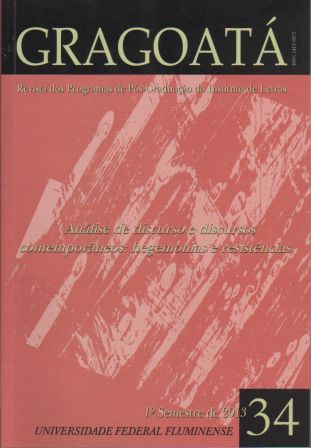A discursive analysis of subjects that stutter
DOI:
https://doi.org/10.22409/gragoata.2013n34a32964Keywords:
Stuttering, Speech, discursive formationsAbstract
The linguistic and speech therapy’s studies see the stuttering as a manifestation of something that happens in the body plan, well meaning as muscle tension, sometimes as breathing, speech production, or even genetic formation, as a subject, therefore, with a “disease”. When scrolling the theoretical discussions about stuttering, we threw up a new look at it from the discursive perspective with possibilities with the same therapeutic approach. From the theory and analytical device of Discourse Analysis from French line, founded by Pêcheux and developed by Orlandi and followers, we intended to analyze the subject who is seen in interdiscourse crystallized by society as subject- -stutter: one who is carrying a disease, inserted into discursive and ideological formations that make him more stutter. We operated discursive clippings of two stuttering-subjects who participated of speech therapy, seen in a longitudinal way. Considering the regularity of the operation of speech and anchoring the analysis in interdiscursivity, i.e., the mechanisms of formation of senses, we identified some discursive formations materialized in the discourse of the analyzed subject and represent theoretical and therapeutic possibilities for the study of stuttering. We affirmed stuttering as a disorder of language, directly related to production conditions, indicating therapeutic possibility in the same perspective. The discursive analysis performed showed apparent change in position of stutterer-subject to fluent-subject.Downloads
Downloads
Published
How to Cite
Issue
Section
License
Authors who publish in Gragoatá agree to the following terms:
The authors retain the rights and give the journal the right to the first publication, simultaneously subject to a Creative Commons license CC-BY-NC 4.0, which allows sharing by third parties with due mention to the author and the first publication by Gragoatá.
Authors may enter into additional and separate contractual arrangements for the non-exclusive distribution of the published version of the work (for example, posting it in an institutional repository or publishing it in a book), with recognition of its initial publication in Gragoatá.

Gragoatá is licensed under a Creative Commons - Attribution-NonCommercial 4.0 International.











